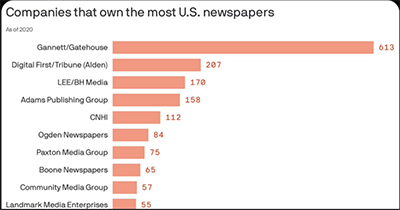 |
||||||||||
|
||||||||||
| Online Privacy’s “Three-Body Problem”? |

MaxwellMolecule, CC BY-SA 4.0
|
| We love to hope and believe that things are sacred and protected online — like one’s privacy — but the sad reality is that it’s not. Over at Mobile Dev Memo, Myles Younger, a former ad tech entrepreneur and now a Senior Director at Media.Monks, breaks down online privacy’s problem via “Physics’ ‘Three-Body Problem,’ which tells us that when you have three planetary bodies orbiting one another in space, it’s impossible to accurately predict their paths due to the complex and ever-changing gravitational relationship between them.” The three bodies here are: tech competitors, government regulators, and public opinion. |
| “The current trends around privacy that started in 2018 are nowhere near resolved; brands and agencies stand little chance of meaningfully influencing events and outcomes, and the events of the next few years cannot be predicted with any certainty.” While the magic 8-ball may not have conclusive answers for us now, one thing that’s certain is “consumer attention via digital media isn’t going anywhere. What’s changing is how that attention is accessed for advertising.” In other words, it’s time to pivot, adapt and go with the (industry) flow. Work with what your company can control and everything else will be on the fly. Hard to imagine, but 99% of companies did exactly this during Covid. “Privacy is causing a quasi reversion to the pre-programmatic world of fragmented digital media and audience management.” That means companies will need to manage and measure media in walled gardens sans third-party cookies and mobile advertising IDs. Marketers will need to embrace “Google Chrome’s FLoC / FLEDGE proposals, Unified ID 2.0, direct publisher deals, or audience activation via cloud-based clean rooms.” “In the future, digital advertising data will move server-to-server or it won’t move at all. Brands should begin investing heavily in reskilling their in-house teams while confirming that their trusted agency partners are reskilling too.” Younger wrote about this for AdMonsters in the past, noting that sometimes what’s old is new again. And to survive, old-school tactics might be your company’s best bet. “Marketers spent the latter half of the previous century perfecting cookieless measurement techniques with zero user-level insight.” “When you take ‘classical’ measurement techniques and deploy them within a digital ad architecture, you can get pretty powerful results. If user-level measurement no longer yields enough data, just dust off your ‘Ad Ops 101’ textbook and start parsing data by geography, publisher, creative, keyword, and so forth. Then throw in some off-the-shelf machine learning software to find new and non-obvious patterns in your measurement data.” “The post-cookie technology and regulatory landscape is just now dawning, and we can look forward to a great deal of innovation. And frustration. And confusion. And surprise.” |
| Facebook Is Still Tracking Teens on Social… When They Said They Weren’t |
| Per research from Fairplay, Global Action Plan and Reset Australia, Facebook continues to target teens on its social networks even though they said that practice would discontinue. The company announced this summer that it would limit how advertisers could reach kids. The research found that Facebook “has retained its algorithms’ abilities to track and target kids — continuing to maintain its AIs’ ability to surveil children so it can use data about what they do online to determine which ads they see in order to maximize engagement and boost its ad revenues.” |
| So we can’t take a social media behemoth at its word (allegedly)? Facebook can change its name all it wants but the problems the company faces are deeper and can be potentially detrimental to the health and wellbeing of young teens. Researchers found that “Facebook/Meta is using surreptitiously harvested information (such as from tracking pixels) about children’s online behavior to feed its AI-driven ad targeting in order to keep lining its pockets. “This practice is especially concerning, given ‘optimization’ might mean weight loss ads served to teens with emerging eating disorders or an ad being served when, for instance, a teen’s mood suggests they are particularly vulnerable.” Ironically, researchers noted that if what they discovered was accurate, then targeting teens is even more thorough than it was previously. “Researchers created three experimental Facebook accounts — on ‘clean browsers’ — with one registered with the age of a 13 year old and the other two for 16 year olds. Our test account browsed a number of webpages containing an embedded Facebook Pixel. As the test account was logged in to Facebook, data about these visits could be identified by Facebook Pixel because of the login Cookie ‘c_user,’” they said. In response, Facebook said it wasn’t using the tracking data that’s linked to teens’ accounts to customize ads to them and gave an explanation as to why this info appears. “It’s wrong to say that because we show data in our transparency tools it’s automatically used for ads. We don’t use data from our advertisers’ and partners’ websites and apps to personalize ads to people under 18. The reason this information shows up in our transparency tools is because teens visit sites or apps that use our business tools. We want to provide transparency into the data we receive, even if it’s not used for ads personalization.” Essentially, Facebook is saying that it will not allow advertisers to track teens or anyone by their political beliefs, sexual orientation or religion, but the company’s AI will store and identify proxies that can be used to transfer this knowledge, and not in a clear, upfront, transparent manner. “A bipartisan coalition of state attorneys general just opened an investigation into Meta, focusing on whether the parent company of Instagram and Facebook violated consumer protection laws by promoting social networking products to children and teens. At least 11 states are involved in the investigation, including California, Florida, Kentucky, Massachusetts, Minnesota, Nebraska, New Jersey, New York, Oregon, Tennessee and Vermont, as well as the District of Columbia.” |
| WarnerMedia Launching Nielsen Competitor in 2022 |
| Following The Media Rating Council’s decision to strip Nielsen of its accreditation for its national ratings system, numerous companies have expressed interest in creating their own version of Nielsen’s offerings. WarnerMedia is the latest company to put their hat in the ring. “We are doing this because we believe that there has got to be a better alternative in measurement solutions, and we have a responsibility to our investments, to our clients and partners, and to counting the value of our audience — full stop,” said Andrea Zapata, who oversees data, research and insights for WarnerMedia’s ad-sales unit. |
| What’s the old saying: Strike while the iron is hot? Or at least when the company who has maintained something close to a monopoly on this section is the industry is down, but not out. “WarnerMedia isn’t the only media company trying to develop new tallies. NBCUniversal has since August been in discussions about building a new measurement concept. Meanwhile, ViacomCBS has been working with VideoAmp to develop a new means of tracking the reach of advertising among linear and digital viewers.” “A hot-button issue for the past few years has been whether Nielsen can evolve its systems quickly enough to count viewers of shows on both traditional networks and new ad-supported streaming hubs in a way that makes advertisers confident in understanding who they reach, and networks feel they are being paid for all the consumers they bring to a screen — no matter what kind it is.” WarnerMedia notes that while Nielsen is a large part of its past, the company still has the opportunity to play a role in its future. WarnerMedia is speaking with a handful of competing Nielsen vendors about a potential partnership down the line. They include: Comscore, iSpot, TVSquared, 605 and VideoAmp. |
 |
||||
|
||||
 |
||||
|
||||
 |
||||
|
| @{optoutfooterhtml}@ |






